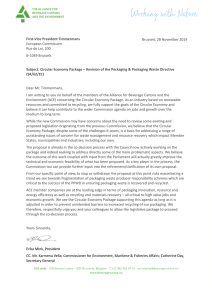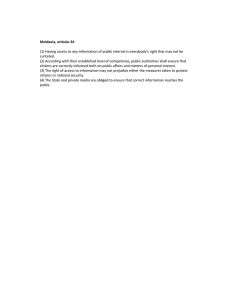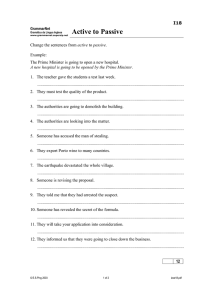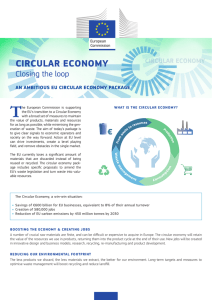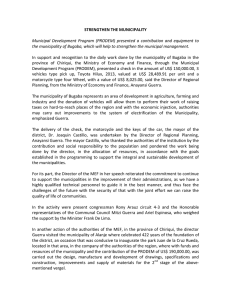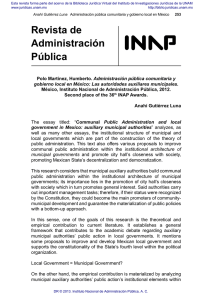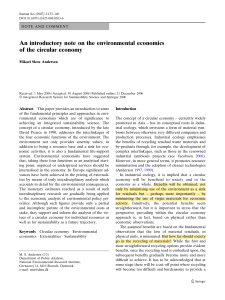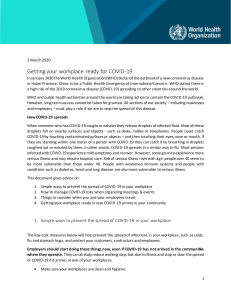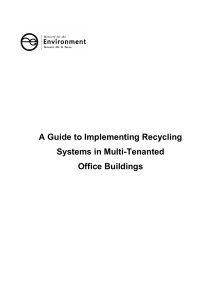Towards a circular economy - review of EU waste legislation
Anuncio
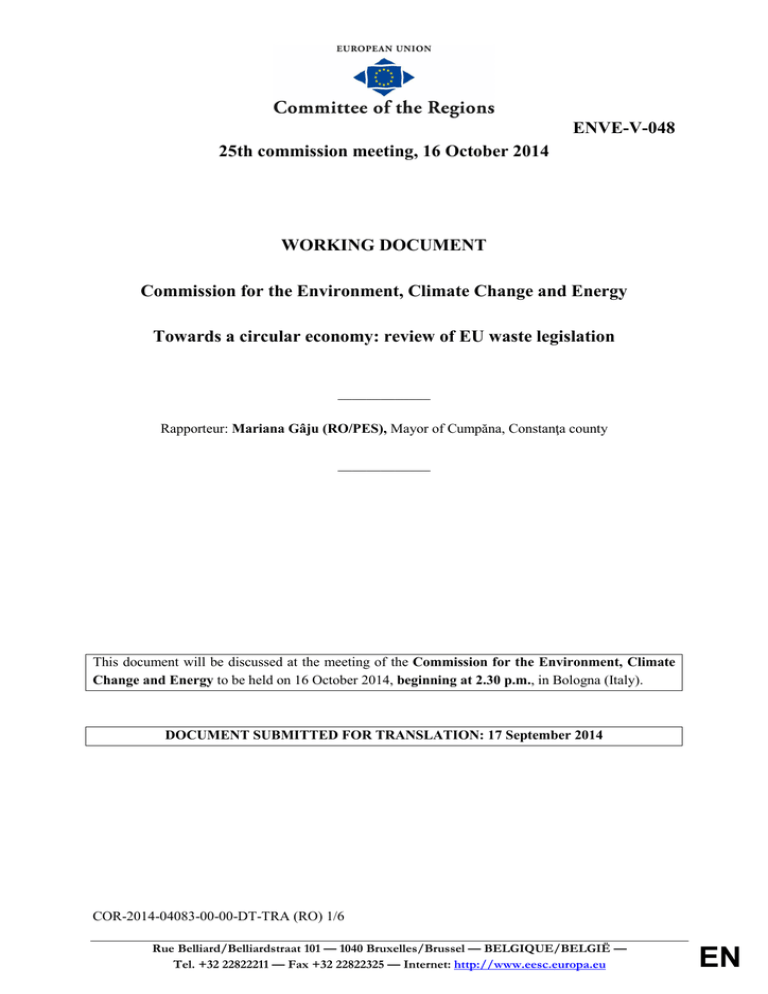
ENVE-V-048 25th commission meeting, 16 October 2014 WORKING DOCUMENT Commission for the Environment, Climate Change and Energy Towards a circular economy: review of EU waste legislation _____________ Rapporteur: Mariana Gâju (RO/PES), Mayor of Cumpăna, Constanţa county _____________ This document will be discussed at the meeting of the Commission for the Environment, Climate Change and Energy to be held on 16 October 2014, beginning at 2.30 p.m., in Bologna (Italy). DOCUMENT SUBMITTED FOR TRANSLATION: 17 September 2014 COR-2014-04083-00-00-DT-TRA (RO) 1/6 Rue Belliard/Belliardstraat 101 — 1040 Bruxelles/Brussel — BELGIQUE/BELGIË — Tel. +32 22822211 — Fax +32 22822325 — Internet: http://www.eesc.europa.eu EN Reference documents Communication from the Commission to the European Parliament, the Council, the European Economic and Social Committee and the Committee of the Regions – Towards a circular economy: A zero waste programme for Europe COM(2014) 398 final Proposal for a directive of the European Parliament and of the Council amending Directives 2008/98/EC on waste, 94/62/EC on packaging and packaging waste, 1999/31/EC on the landfill of waste, 2000/53/EC on end-of-life vehicles, 2006/66/EC on batteries and accumulators and waste batteries and accumulators, and 2012/19/EU on waste electrical and electronic equipment COM(2014) 397 final - 2014/0201 (COD) COR-2014-04083-00-00-DT-TRA (RO) 2/6 I. INTRODUCTION 1. The Commission's proposals on waste management On 2 July 2014, the European Commission adopted a package of measures on the circular economy. This package includes a legislative proposal for new targets for recycling/reuse of municipal waste, recycling of packaging waste and reducing landfilling of recyclable waste. To this end, it has developed a new strategy aiming to achieve full implementation of existing legislation by 2020, and to set a pathway towards long-term objectives for 2030. These goals can be achieved by combining a set of new measures with existing measures, both legislative and non-legislative. 2. Make-up of the proposals The package of measures adopted and published on 2 July contains: − − 3. the Communication from the Commission Towards a circular economy: A zero waste programme for Europe; the proposal for a directive amending Directives 2008/98/EC on waste, 94/62/EC on packaging and packaging waste, 1999/31/EC on the landfill of waste, 2000/53/EC on end-of-life vehicles, 2006/66/EC on batteries and accumulators and waste batteries and accumulators, and 2012/19/EU on waste electrical and electronic equipment. Previous Committee recommendations In July 2013, the Committee of the Regions drew up an opinion on the review of the European Union's key waste targets. It primarily advocated the following: − − − − − − − − a responsible, sustainable waste prevention and management policy; encourage the least performing Member States and local and regional authorities to pursue their efforts to improve their performance levels; strengthen national and international cooperation to support the development of infrastructures, methods and capacities for good waste management; the importance of having European waste statistics, which include regional data; establish new targets closely in line with the scope for implementation in all Member States and local and regional authorities, by respecting the precautionary principle; adopt decoupled intermediate targets and give Member States and local and regional authorities a degree of flexibility, taking account of their individual levels of development; full application of the "polluter-pays" principle; create a common language on waste management by establishing a single method for calculating waste, a European lexicon for waste and a nomenclature for the classification of all waste streams. COR-2014-04083-00-00-DT-TRA (RO) 3/6 4. Rationale for a new opinion Following the publication of the package of measures on the circular economy, the CoR is currently drawing up a new opinion, drawing on the opinion it issued in 2013 and incorporating points that are important and relevant for the Committee of the Regions. This working document sets out a brief overview of the new proposals, alongside concise analysis and a series of questions to the members of the ENVE commission. II. POINTS RELEVANT TO THE COMMITTEE OF THE REGIONS Recent trends and studies suggest that further progress on resource efficiency is possible and that it can bring major economic, social and environmental benefits. Turning waste into a resource is an essential part of increasing resource efficiency and closing the loop in a circular economy. 1. The European Commission's objectives The main overarching objective is to ensure that valuable materials contained in waste are reused, recycled and efficiently reintegrated into the EU economy, thus making progress towards a circular economy in which waste is gradually used as a resource and new economic opportunities and jobs are created. The specific objectives of the proposal: − − − − 2. to simplify EU waste legislation by clarifying and simplifying how waste is measured, clarifying the main definitions and simplifying reporting obligations; to enhance monitoring by improving the quality of statistics on waste and implementing an early warning system; to ensure optimal waste management in all Member States by promoting the dissemination of best practices and ensuring a minimum level of harmonisation of extended producer responsibility schemes; to establish medium-term waste targets, in accordance with the EU's ambitions regarding resource efficiency and access to raw materials. Aspects relevant to the CoR (territorial and regional differences) Beyond setting ambitious and binding targets, more in-depth analysis reveals a number of additional aspects that should be taken into consideration in drafting the new opinion: − − − by 2012, only one third of Member States had reached the 40% municipal waste recycling target; half of all Member States are still landfilling more than 50% of waste generated; at regional level, the recycling/composting rate varies between 5% and 70%; COR-2014-04083-00-00-DT-TRA (RO) 4/6 − increasing recycling levels is problematic in regions where GDP is below EUR 20 000, in regions with a low population density, in regions with a very high population density, and in urban areas and regions in the south and east of the EU. In the light of these aspects, it is clear that without additional support measures, the new targets may have adverse effects, such as: increased waste management costs, increased traffic as regards transport to waste management facilities, a decline in the quality of recycled materials and an increase in the quantities of hazardous substances discharged into the environment. 3. The CoR's proposals (comments) The application, feasibility and impact of the proposal for a directive COM(2014) 397, which covers waste management targets, will vary from one Member State to the next, and from one region to the next. This will generally depend on the existing level of implementation, and on the experience gained in waste management. Moreover, the point should be made that the national recycling rate is not always representative of the achievements of the regions, which vary greatly, even within a given country. 3.1 Setting new waste recycling targets with new deadlines The Commission is proposing to increase the recycling/reuse rates for municipal and packaging waste by setting new targets (70% for municipal waste in 2030 and 80% for packaging waste in 2030). Do you agree with setting uniform targets for all Member States? Please elaborate on your answer. Are you in favour of setting intermediate targets and transitional periods in line with Member States' performances and starting points? Please elaborate on your answer. 3.2 Phasing out landfilling of recyclable waste The Commission is proposing to phase out landfilling of plastics, paper, metals, glass and bio-waste by 2025 – corresponding to a maximum landfilling rate of 25% for municipal waste. Do you think 2025 is a realistic deadline? Please elaborate on your answer. Do you think that this sharp decrease in the percentage of municipal landfilling will put local and regional authorities under pressure? Please elaborate on your answer. 3.3 Full application of the "extended producer responsibility" principle In order to enhance waste prevention, the Commission is proposing full application of the "extended producer responsibility" principle, which may help limit the financial and organisational pressure exerted on local and regional authorities. COR-2014-04083-00-00-DT-TRA (RO) 5/6 Do you think that the application of this principle will help limit the financial and administrative pressure on local and regional authorities? Please elaborate on your answer. 3.4 Eliminating disparities between regions The Commission notes that there are wide disparities between the regions when it comes to waste prevention and management. The CoR recommends supporting the development of infrastructures, methods and capacities for better waste management by and for the least performing Member States and local and regional authorities, in particular by strengthening national and regional cooperation at local and international level. Do you think that disseminating examples of best practices and tailoring them to the specific circumstances of regions will help to gradually iron out the disparities between regions and meet the targets set by the Commission? Please elaborate on your answer. 3.5 Introduction of modified reporting obligations The Commission is proposing to increase the frequency of reporting by Member States to annually as regards the implementation of recycling targets for municipal waste, targets for packaging waste as well as landfill diversion targets. Do you think it would be a good idea to introduce reporting obligations at regional level? In your view, would this help enhance the success of the policy at regional level? Please elaborate on your answer. 3.6 The role of the CoR and local and regional authorities in implementing EU waste policy The CoR underlines the clearly essential role of local and regional authorities in implementing EU policy in this field, in creating and funding infrastructure for processing and storing waste and in the operational management of waste streams, which are the major economic challenges facing local and regional authorities here. Do you think that implementing the new targets will put pressure on the budgets of local and regional authorities, and on their administrative and operational capacity? Please elaborate on your answer. The CoR stresses that the success of the measures arising from implementation of the circular economy package hinges on local and regional authorities. It is very clear that much greater support needs to be given to local and regional authorities, with a view to full and effective compliance with the measures in the package, in the name of an EU environmental policy that is sound, and above all, sustainable. _____________ COR-2014-04083-00-00-DT-TRA (RO) 6/6
